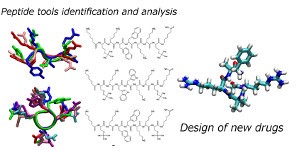AME – Artificial Metallo Enzymes

Room 2Mc-33; phone +39-081-674399 Email vincenzo.pavone@unina.it;

Prof. Angelina Lombardi
Room 2Mc-35; phone +39-081-674418 Email angelina.lombardi@unina.it;

Prof. Flavia Nastri
Room 2Mc-38; phone +39-081-674419 Email flavia.nastri@unina.it;

Dr. Ornella Maglio
Room 2Mc-26; phone +39-081-674400 Email ornella.maglio@unina.it;
orcid, webdocenti

Dr. Marco Chino
Room 2Mc-23; phone +39-081-674421 Email marco.chino@unina.it;

Dr. Daniele D'Alonzo
Room 2Mc-28; phone +39-081-674429 Email daniele.d'alonzo@unina.it;
Other Group members:
Post-Docs: Dr. Maria De Fenza, Dr. Linda Leone
PhD students: Dr. Salvatore La Gatta, Dr. Fabio Pirro, Dr. Emilia Renzi
Research: Our research focuses on the design of artificial metalloproteins and small molecules with the aim to: (i) master the principles of protein folding and function; (ii) understand the structure-function relationship in metal catalysis; (iii) develop new molecules/materials as drugs or biosensing. Main themes are:
Development of Artificial Metalloenzymes
Design of peptides and peptidomimetics as drugs
Development of bio-inspired devices by immobilization of peptides and proteins on different surfaces
Development of Artificial Metalloenzymes
Enzymes catalyze a wide variety of chemical and biological reactions with high efficiency and selectivity. Metal cofactors are involved in several key steps of life machinery. Metalloproteins regulate redox processes and efficiently catalyze difficult reactions under mild conditions. How the fine-tuning of the scaffolds imparts the wide spectrum of reactivity is of crucial interest both in the fields of structural biology and bioinorganic chemistry. Inspired by natural metalloenzymes, our lab uses de novo design and miniaturization to investigate the minimal requirements for function. Both structural and spectroscopic methods help us to test the success of our designs. Advanced chromatographic and stopped-flow methods support our mechanistic and catalytic studies. Final goal is to engineer artificial metalloenzymes having impact in chemical and biotechnological applications.
Main collaboration: Prof. W.F. DeGrado (UCSF, USA), Prof. K. Bren (University of Rochester, NY, USA), Prof. R. O. Louro, (ITQB, New University of Lisbon, Spain), Prof. V. Balland (Université Paris Diderot, Paris, France), Dr. G. Caserta (TU Berlin, Berlin, Germany)

Design of peptides and peptidomimetics as drugs
The development of molecular tools able to freeze linear and cyclic peptides in a well-defined three-dimensional structure, represents a basic research topic for the design of new molecules capable of reproducing the chemical and structural properties of natural systems. They contribute to a better understanding of the structural requirements for function in biological macromolecules, and also allow the development of new, pharmacologically interesting products. Our lab adopts a series of "molecular tools", developed in the last 20 years of experience, to design and synthesize biologically active peptides. These compounds are valuable for the study of biological processes and some of them find applications as drugs (potent inhibitors, agonists, etc.).
Main collaboration: Dr.ssa M.V Carriero (Istituto Nazionale dei Tumori di Napoli), Prof. C. Schiraldi (Università degli Studi della Campania "Luigi Vanvitelli"), Dr.ssa A. Arciello, Dr. E. Notomista (Università degli Studi di Napoli "Federico II").

Development of bio-inspired devices by immobilization of peptides and proteins on different surfaces
Biomaterials and biodevices are currently changing the biotech and pharma industries. Many start-up all over the world are trying to make this transition possible. We adopt our designed biomolecules (Artificial Metalloenzymes, Bioactive Peptides) to build hybrid nanostructures for diagnostics, bioremediation, and energy storage. By several conjugation methods, we functionalize polymeric surfaces, resins and gold nanoparticles with biological recognition elements, oxidative enzymes or photosensitizers.
Main collaboration: Dr. R. Battaglia, Dr. M. Mauro (Novaetech S.r.l., Napoli), Prof. C. De Rosa, Prof. F. Auriemma (Università degli Studi di Napoli "Federico II", Napoli), Dr. G. Manco, Dr. F. Febbraio (Institute of Protein Biochemistry, CNR. Napoli), Prof. Teresa Pineda (Universidad de Córdoba, Córdoba, Spain)
